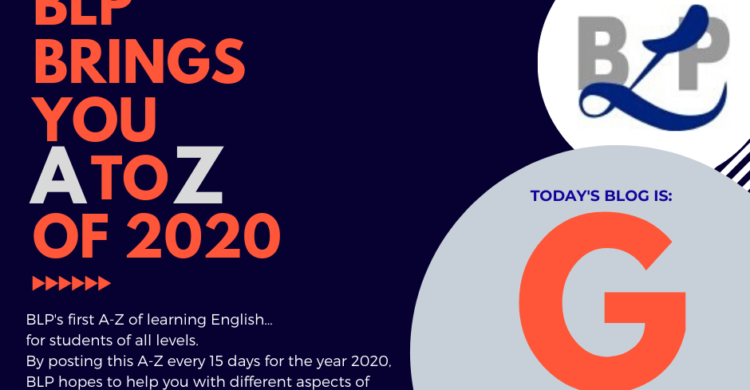BLP A-Z of Learning English: «G» for «Good English Language Student»
Maria del Pilar Gracia
13/05/2020
How to be a Good English Language Student
The “G” of this series was quite a difficult one to choose. Should the blog be about Grammar, Gerund or Google? So, I’ve focussed on “G” for good and what makes a good student.
Firstly, let it just be said that as teachers the least we can strive for is “Good”. We need to be better than good to really help our students on this journey, but ultimately your learning is in your hands. And what is going to make you a good student?
Since I’m first and foremost a teacher, let’s look at some adjectives and how they apply to being a good student.
Realistic: One of the first things a student should do with their teacher/trainer is to set realistic goals within a realistic time frame. There is nothing more discouraging to me as a teacher than when a student says “I want to learn English” as their only goal. We need to break down what we can realistically cover and learn in the time frame we have. It could be a three-month intensive course or a full year of twice weekly classes. Whatever the time frame, be realistic in your goals.
Organized: good students keep track of their learning. They keep their material organized as well as keep track of their learning. Organise your material into grammar, functional language, vocabulary, etc. Organize your vocabulary – don’t just learn 10 random words. Learn 10 action verbs or 10 phrasal verbs. Organise your thoughts too, if possible (easier said than done!).
Patient: Good students are patient and kind with themselves. They realize that to learn a language is a huge investment that will take time and effort. And so, they don’t get discouraged at the first misunderstanding with a native speaker nor do they quit when the results aren’t immediate. Language learning is a long-term activity so patience is key.
Courageous: Good students have courage. They are willing to try to communicate even though they’ll most likely make mistakes. They’ll take risks to try to communicate. They ask questions even if they fear that the question is “stupid”. For the record – NO question is ever stupid. If you have doubts or uncertainties, it’s the trainer’s job to help clarify.
Motivated: Good language learners are motivated to learn. They might be motivated to learn the language because this knowledge will advance them in their careers or possibly because they enjoy travel and language skills make travelling more enriching. Whatever your motivation is, a good student never loses sight of why they want/need to learn – because they’re going to need to call on that sense of motivation when the learning becomes difficult (which at some point it will!).
Strategic: Good students analyse English with their mother tongue to find similarities and exploit them. Spanish students already know a good chunk of English thanks to the link with Latin. Good students see patterns and try to apply them.
Consistent: As I’ve said in a previous blog, a good student is constant and consistent. It’s much more useful to practice 30 minutes a day every day than it is to spend 2 hours at the weekend. The daily repetition is key to our learning. Practice makes perfect.


























Leave a Comment
Lo siento, debes estar conectado para publicar un comentario.